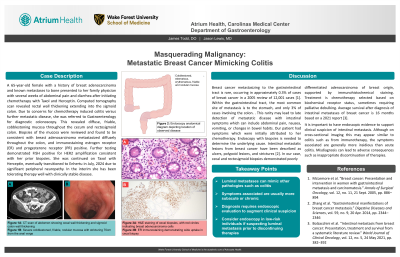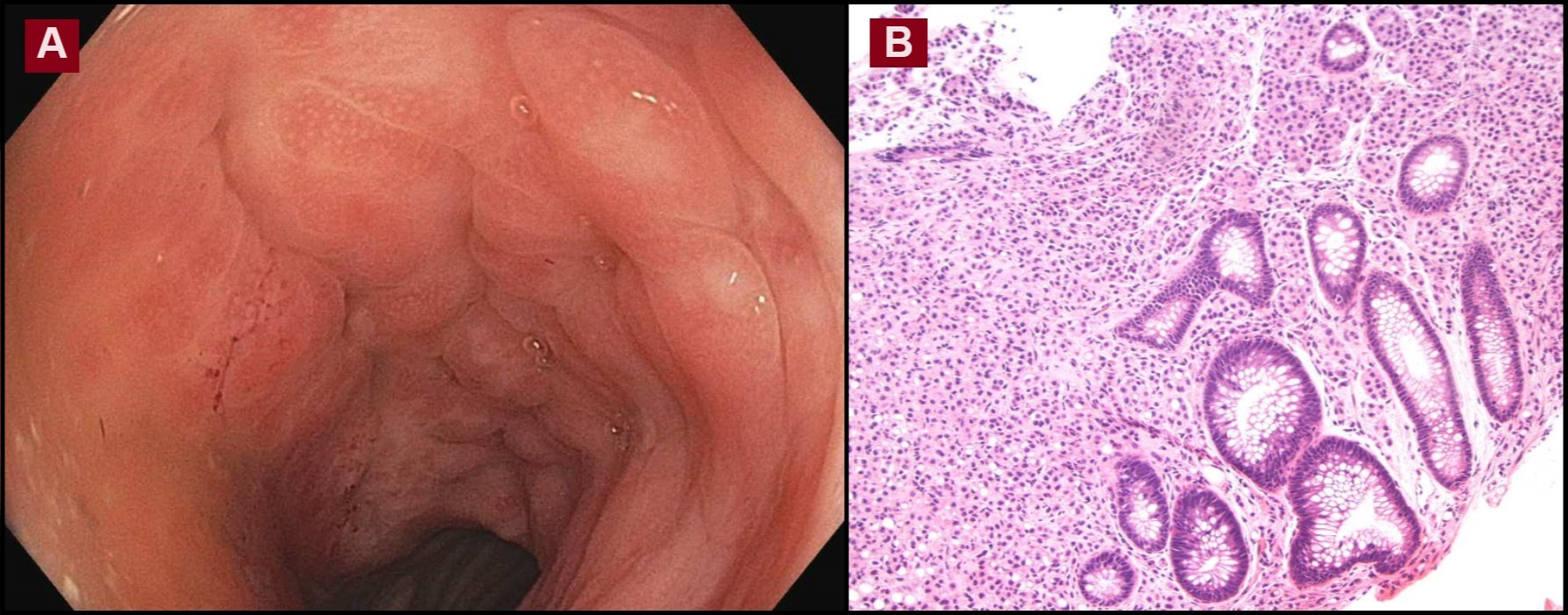Sunday Poster Session
Category: Colon
P0307 - Masquerading Malignancy: Metastatic Breast Cancer Mimicking Colitis
Sunday, October 27, 2024
3:30 PM - 7:00 PM ET
Location: Exhibit Hall E

Has Audio

James Z. Todd, DO
Atrium Health
Charlotte, NC
Presenting Author(s)
Award: Presidential Poster Award
James Z. Todd, DO
Atrium Health, Charlotte, NC
Introduction: Breast cancer metastasizing to the gastrointestinal tract is rare, occurring in approximately 0.3% of cases in a 2005 review of 12,001 cases. Within the gastrointestinal (GI) tract, the most common site of metastasis is to the stomach, and only 3% of cases involve the colon. We present a 65-year-old female with lobular breast adenocarcinoma who was found to have multiple, confluent, contiguous regions of metastatic disease throughout the colon.
Case Description/Methods: A 65-year-old female with a history of breast adenocarcinoma and known metastases to bone presented to her family physician with several weeks of abdominal pain and diarrhea after initiating chemotherapy. Computed tomography scan revealed rectal wall thickening extending into the sigmoid colon. Due to concerns for chemotherapy induced colitis, she was referred to Gastroenterology for diagnostic colonoscopy. Endoluminal exam revealed diffuse, friable, cobblestoning mucosa throughout the cecum and rectosigmoid colon (Figure 1A). Biopsies of the mucosa were found to be consistent with breast adenocarcinoma metastasized diffusely throughout the colon (Figure 1B).
Discussion: Colonic metastases from primary breast cancer are uncommon, with bone and lung most seen. This rarity may lead to late suspicion of metastatic disease with intestinal symptoms which can include abdominal pain, nausea, vomiting, or changes in bowel habits. Our patient had symptoms which were initially attributed to her chemotherapy. Endoscopy with biopsies is needed to determine the underlying cause of colitis. Intestinal metastatic lesions from breast cancer have been described as ulcers, polypoid lesions, and strictures. Rarely, the appearance of mucosal inflammation is the primary description. In our case, cecal and rectosigmoid biopsies demonstrated poorly differentiated adenocarcinoma of breast origin, supported by immunohistochemical staining. Treatment is selected based on biochemical receptor status, and some require palliative debulking. Average survival after diagnosis of intestinal metastases of breast cancer is 16 months based on a 2021 report.

Disclosures:
James Z. Todd, DO. P0307 - Masquerading Malignancy: Metastatic Breast Cancer Mimicking Colitis, ACG 2024 Annual Scientific Meeting Abstracts. Philadelphia, PA: American College of Gastroenterology.
James Z. Todd, DO
Atrium Health, Charlotte, NC
Introduction: Breast cancer metastasizing to the gastrointestinal tract is rare, occurring in approximately 0.3% of cases in a 2005 review of 12,001 cases. Within the gastrointestinal (GI) tract, the most common site of metastasis is to the stomach, and only 3% of cases involve the colon. We present a 65-year-old female with lobular breast adenocarcinoma who was found to have multiple, confluent, contiguous regions of metastatic disease throughout the colon.
Case Description/Methods: A 65-year-old female with a history of breast adenocarcinoma and known metastases to bone presented to her family physician with several weeks of abdominal pain and diarrhea after initiating chemotherapy. Computed tomography scan revealed rectal wall thickening extending into the sigmoid colon. Due to concerns for chemotherapy induced colitis, she was referred to Gastroenterology for diagnostic colonoscopy. Endoluminal exam revealed diffuse, friable, cobblestoning mucosa throughout the cecum and rectosigmoid colon (Figure 1A). Biopsies of the mucosa were found to be consistent with breast adenocarcinoma metastasized diffusely throughout the colon (Figure 1B).
Discussion: Colonic metastases from primary breast cancer are uncommon, with bone and lung most seen. This rarity may lead to late suspicion of metastatic disease with intestinal symptoms which can include abdominal pain, nausea, vomiting, or changes in bowel habits. Our patient had symptoms which were initially attributed to her chemotherapy. Endoscopy with biopsies is needed to determine the underlying cause of colitis. Intestinal metastatic lesions from breast cancer have been described as ulcers, polypoid lesions, and strictures. Rarely, the appearance of mucosal inflammation is the primary description. In our case, cecal and rectosigmoid biopsies demonstrated poorly differentiated adenocarcinoma of breast origin, supported by immunohistochemical staining. Treatment is selected based on biochemical receptor status, and some require palliative debulking. Average survival after diagnosis of intestinal metastases of breast cancer is 16 months based on a 2021 report.

Figure: Figure 1A: Severe cobblestoning, edematous, friable mucosa in the ascending colon. | Figure 1B: Poorly differentiated adenocarcinoma from colon biopsy, consistent with breast primary.
Disclosures:
James Todd indicated no relevant financial relationships.
James Z. Todd, DO. P0307 - Masquerading Malignancy: Metastatic Breast Cancer Mimicking Colitis, ACG 2024 Annual Scientific Meeting Abstracts. Philadelphia, PA: American College of Gastroenterology.

